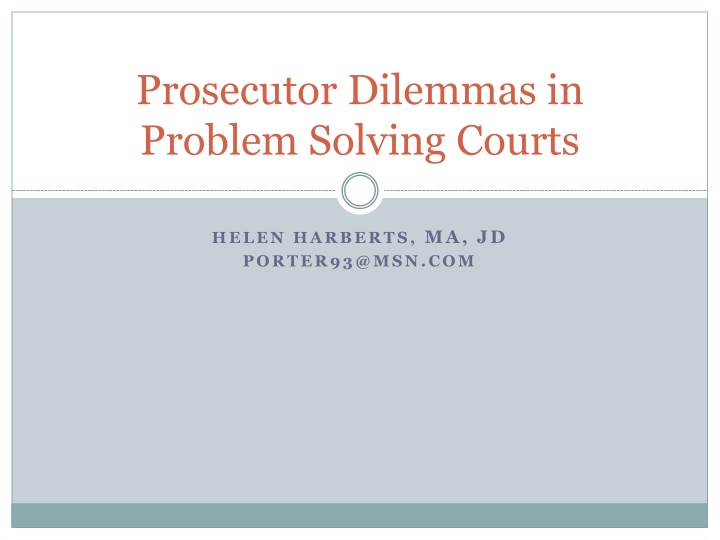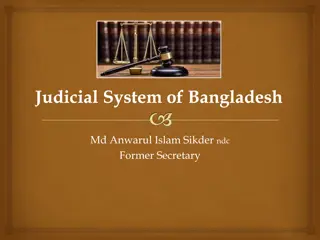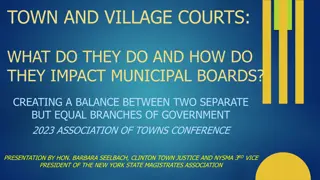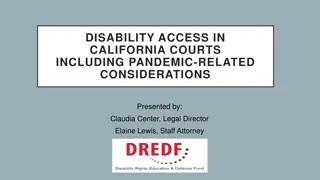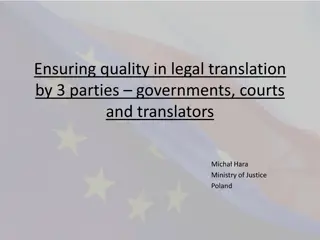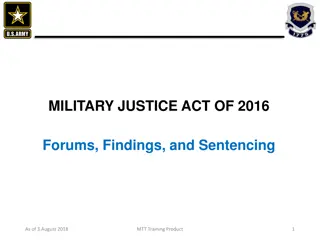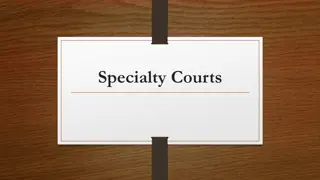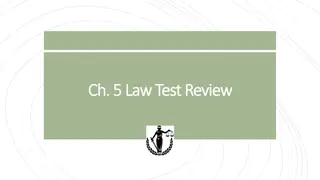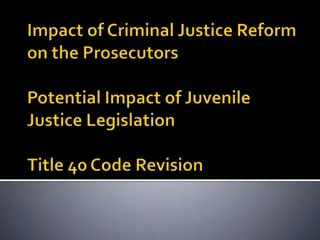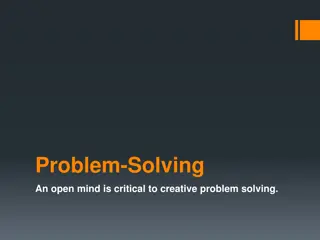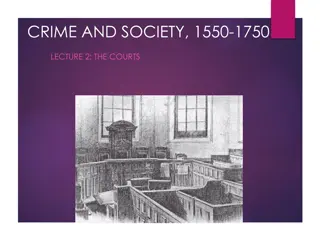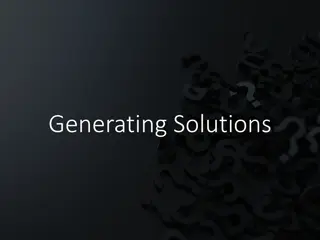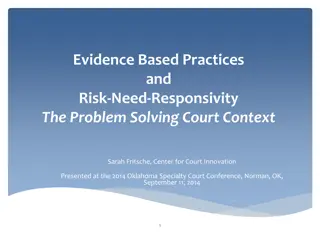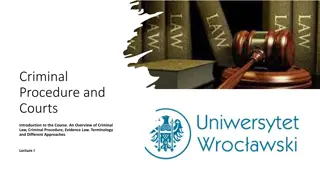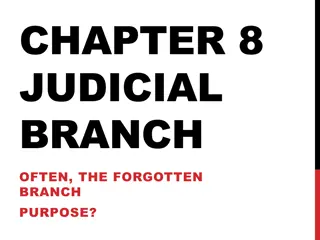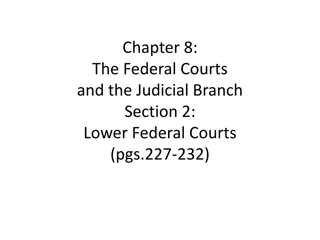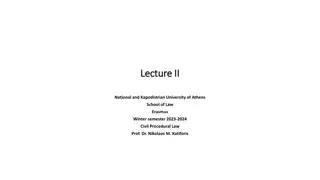Challenges and Innovations in Problem-Solving Courts
Helen Harberts, a skilled MA and JD with expertise in problem-solving courts, delves into the dilemmas faced by prosecutors in these courts. Through in-depth insights and thought-provoking questions, the narrative explores the effectiveness of traditional responses to addiction-based offenses, public perceptions of justice outcomes, and areas for improvement in the criminal justice system. The overview emphasizes the key components, guiding principles, and core competencies essential to enhancing the functionality of problem-solving courts.
Download Presentation

Please find below an Image/Link to download the presentation.
The content on the website is provided AS IS for your information and personal use only. It may not be sold, licensed, or shared on other websites without obtaining consent from the author.If you encounter any issues during the download, it is possible that the publisher has removed the file from their server.
You are allowed to download the files provided on this website for personal or commercial use, subject to the condition that they are used lawfully. All files are the property of their respective owners.
The content on the website is provided AS IS for your information and personal use only. It may not be sold, licensed, or shared on other websites without obtaining consent from the author.
E N D
Presentation Transcript
Prosecutor Dilemmas in Problem Solving Courts HELEN HARBERTS, MA, JD PORTER93@MSN.COM
Roll Call! Who is in the room? How many years in problem solving assignment? Sole assignment? What else do you do? Are you the sole DA assigned to problem solving courts? Have you attended training?
Why would we do something different than we always have? Do you think what traditional responses to addiction based offenses work as well as you hoped they would? Do you think the public is pleased with the standard criminal justice outcomes? Are you pleased with outcomes? What could be better?
What do we know about problem solving courts? They work There are ways to make them work better They work on a basic set of rules (10 Key Components, Guiding Principles of DWI Courts) They are research driven, and constantly improving.
Overview: Core Competencies Guiding Principles of DUI Courts Ten Key Components of Drug Courts Psychopharmacology of addiction Targeting and Assessments Treatment strategies Placebo Engagement Assistive medications Assumption of co-occurring disorders Complex case management. Competent manualized treatment
Balance of concerns Primary directive: public safety Other concerns: Elected boss Career advancement Ethical concerns Did I mention public safety? Hug a thug Not my educational background or interest.
QUADRANT MODEL High Risk Low Risk FOCUS here for public safety Treatment Accountability High Needs (Pro-social habilitation) Treatment Adaptive habilitation Pro-social habilitation 200 hours of tx (combo) Adaptive habilitation 300 hours of tx (combo) Accountability Secondary prevention Low Needs NO TREATMENT! Diversion Pro-social habilitation 12-20 hours of ed (Adaptive habilitation) 150 hours of criminal thinking
High Risk/High Needs High risk??? HIGH RISK is a term of art. It DOES NOT mean dangerous to public safety. It means that the person cannot succeed on a grant of probation without help. It means high risk to fail standard community supervision BUT, you must watch for public safety issues and issues related to your office within this group.
Some gotta go. The clear majority of the high risk folks will be a good public safety risk if placed in a problem solving court, NOT on a standard grant of probation, or parole. Some just have to go to prison, but plan now for re- entry because they will be back. Facts that shock the community Facts that are beyond office tolerance
You are the gatekeeper and the quality control monitor Who has the power in the room? Learn about good treatment, what it is, and what you should be seeing in your Court. If you don t see it, begin asking. Learn about what is required for this population to succeed and then pursue it. Learn all the alphabet. MET, MRT, MI TBI/PTSD/trauma responsive treatment, CBT, etc. Hold the team accountable for providing these services, ask questions, and pursue answers.
Understand the complexity Learn what needs to be done, and monitor same Learn what works to change behavior it isn t what you think. Jail? Nope. Doesn t work. Listen to your treatment professionals on their matters of expertise. Your expertise is the law. Be very patient. This is a fatal disease of the brain. Think: stroke patient.
Monitor due process! Prosecutors have a different ethical mandate than the defense! We are required to see that due process is followed and justice is done. Do NOT allow short cuts with the law. Cover your record, and make certain both good and bed news is on the record for appeal.
Ethical concerns Can t use information learned in drug court In office (new files, etc.) With cops (no intel) Other cases (civil) They all want to talk to you without counsel present (red alert) They call you for help when they are scared They call to thank you.
First things first: These are court programs, and the rights which attach to court proceedings are present. It is the job of counsel, especially the prosecutor, to see to it that due process is followed, and that justice is done. For prosecutors, it is an ethical mandate.
Legal Issues Attorney participation is critical-both for outcomes, and to protect due process. Ethical concerns of counsel (or others) are not gone because it is a DUI or Drug Court . Honor the boundaries. Due process is not suspended because we all work together .
What to watch out for: Confidentiality Laws NOTE: Montana v. Plouffe 7/15/14 2014 MT 183 Ex Parte Communications Waiver for Court with caution & watch out Counsel! Judicial Fraternization/Impartiality Brief appearances only-then leave Role of Defense Counsel Like sprinting through a mine field
First Amendment: Life Ring Religion Ex: NO mandatory AA/NA without alternatives being offered as well. This is settled law. It does not matter that this is a voluntary program This is settled law. Adapt. Civil liability may attach for intentional violation. Smart Recovery
Another First Amendment issue: Area and place restrictions: Ex: Do not enter any establishment where . Valid if narrowly drawn and related to rehabilitation needs of the offender. Must have allowances for compelling needs of probationer such as child visitation. Should be reasonable in size and duration.
First Amendment Freedom of association Ex: Do not associate with any person on probation or parole, or any person who uses drugs, except in the context of treatment Valid if narrowly drawn and related to rehabilitation needs of the offender.
Fourth Amendment You are subject to a search of your person, place of residence, vehicle, or any item under your dominion and control any time, day or night, with or without probable cause, or your then and there presence, by any peace or probation officer. You are subject to testing for the presence of banned items and controlled substances for the duration of your participation in the program.
Search Post conviction: 4th Amendment waivers are valid under Federal law-reduced expectation of privacy Sampson (2006). Pre conviction and non-conviction cases, must be individualized findings to apply search on a case by case basis (also true on some local state cases post conviction) Make it a program rule.
Other bans: Alcohol- OK: People v. Beal (CA 1997) Articulate why medical marijuana cannot be used on record, and place as a term of probation. (interferes with cognition) Articulate why folks cannot consume any item not for human consumption , poppy seeds, or other items that will mess up drug testing.
Due Process Concerns Juvenile have the same rights as adults regarding due process, except for jury. What process is due when defendants potentially suffer a loss to a recognized liberty or property right? Program violation: probation-full panoply of rights apply. (PC, counsel, notice, appear, cross exam and witnesses, magistrate, findings)
Due Process concerns Termination is LIKE a VOP hearing in most cases Watch your record! Incentives and Sanctions should be noted. Contract analysis does not settle the issue States are divided on hearings for non probation programs. Best practice: follow the VOP procedure.
Question: Is a sanction a potential loss of a recognized liberty or property right? Does it invoke the same level of due process as a VOP? Certainly if you are a post adjudication probation model. Probably if you are not. Best practice: do it. Adds about 45 seconds to the colloquy.
Consider this Is really about the factual basis or about the factors in mitigation and sanctions? What would you prefer if it was you in the client s shoes? Full due process?
Remember your record! You need to document not just the sanctions but the good reviews and incentives in some manner for potential review. If someone questions what happened in a couple of years, how will they know why you did, what you did?
Equal Protection issues: Poverty-you cannot deny access to indigents. Admission based on ability to pay is a denial of equal protection. Discretionary admission criteria must not violate due process (suspect class, semi-suspect class) DA may be gatekeeper for admission, and unless constitutional violation, no right to hearing to challenge rejection.
Other due process issues: Drug testing: must meet legal standards for adjudications. Not all tests are up to legal standards. Get confirmation via GC/MS if there is a question or challenge. If they pass you pay, if they flunk they pay and they get sanctioned for lying.
Termination & Sentencing Split of authority. Best practice, if they object, get another Judge.
Best Practice: lawyers must be involved This is how we protect the program, protect the clients, and protect the Constitution. It turns out that lawyers also improve outcomes!!!
What does a prosecutor do in these problem solving courts??? Gate keeper/ screener/ referral source Veto when public safety is threatened beyond tolerable limits. Monitor public safety concerns Monitor program fidelity Monitor and encourage program improvements as informed by research. PROTECT DUE PROCESS
What does a prosecutor do in these problem solving courts??? Coordinate efforts with law enforcement Community support and outreach Bully pulpit Balance the power of the Judge Act as a support and cheerleader for success Solicit funds Become a grant applicant Make sure stuff like the Montana case does not happen!
What does a prosecutor do in these problem solving courts??? Participate in incentives Clear away dirty laundry of addiction Find legal solutions to difficult problems Provide political cover for the team SMILE !!! (Who has power in the Courtroom?)
What does a prosecutor do in these problem solving courts??? Use jury trial skills to persuade a different audience: addicted offenders. Support participant progress with all of your power without losing boundaries. Provide consistency and focus Protect due process and the Constitution. In order to do these things, you must fully understand the research and principles that underlie drug court.
What will you get out of a tour in drug court? Job satisfaction A better understanding of how to get success in criminal justice Deeper levels of knowledge in unique areas of practice. In short, you will be a much better prosecutor for whatever else you choose to do.
Who should be in our courts? What is the goal? What is the issue? Who is the group most likely to produce significant drops in crime if they get treatment? Who needs tighter supervision to protect with public safety? Decision tipping point: when does incapacitation become more important than behavior modification?
This requiresunderstanding: the law the HOLES in the law the model the disease. What works How to help treatment what can undo good work sanctions and incentives to shape behavior How to help supervision
What is the goal? What are the proximal goals? What are the distal goals? What is the big goal? What do you have to know/understand to get there?
How do you balance science and the law? Incentives work better than sanctions-but sanctions make the incentives work huh? How does the DA help with this concept? How does the Defense help? What can goof it up? Excessive lawyering? Immediacy and reliable detection are critical? How can lawyers goof this up?
PUNISHMENT!!! Actually, no-it is not the severity but the certainty of getting caught, and sanctioned that is most important for behavior modification. 24-48 hours is often more significant than a longer sentence. Why?
What about the simple facts of addiction? Addiction is a disease of the brain Memory problems Depression, poor decision making Collateral illness Slower recovery times for some drugs Poor life skills and associates The length of time for treatment to work. SHOULD THAT GUIDE YOUR RESPONSE?
So, when folks are just beginning.. What are the proximal goals? What is reasonable to expect? What are the distal goals? When is it reasonable to expect behavior that is heading toward distal goals? What about later on in program? When does the change kick in ? It depends, right?
What can attorneys do? Lots! We can improve outcomes , or kill them
How? Placebo Motivational interviewing Engagement Smoothing out legal delays Expediting responses to behavior Presenting a unified front against the disease.
This is what it looks like when you do it following the research.
Staffing all cases before court-one message & one decision delivered by Judge
Public Defender teaching in the hallways of the courthouse before court
